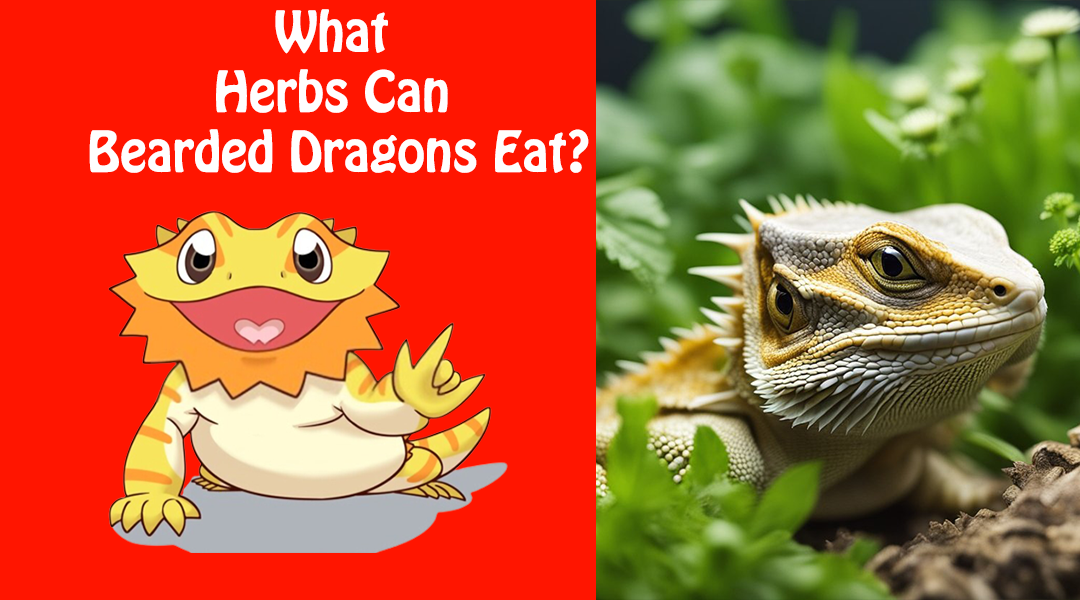Bearded dragons are one of the most popular reptile pets due to their friendly nature and low maintenance. However, it’s important to ensure that they are getting the proper nutrition to maintain their health. One important aspect of their diet is the inclusion of herbs, which can provide a variety of benefits.
Herbs can be a great addition to a bearded dragon’s diet, as they can provide additional nutrients and medicinal properties. Some herbs can also help with digestion, boost the immune system, and even act as natural insecticides. However, it’s important to note that not all herbs are safe for bearded dragons to consume, and some can even be toxic. In this article, we will explore what herbs are safe for bearded dragons to eat and how they can benefit from them.
Safe Herbs for Bearded Dragons
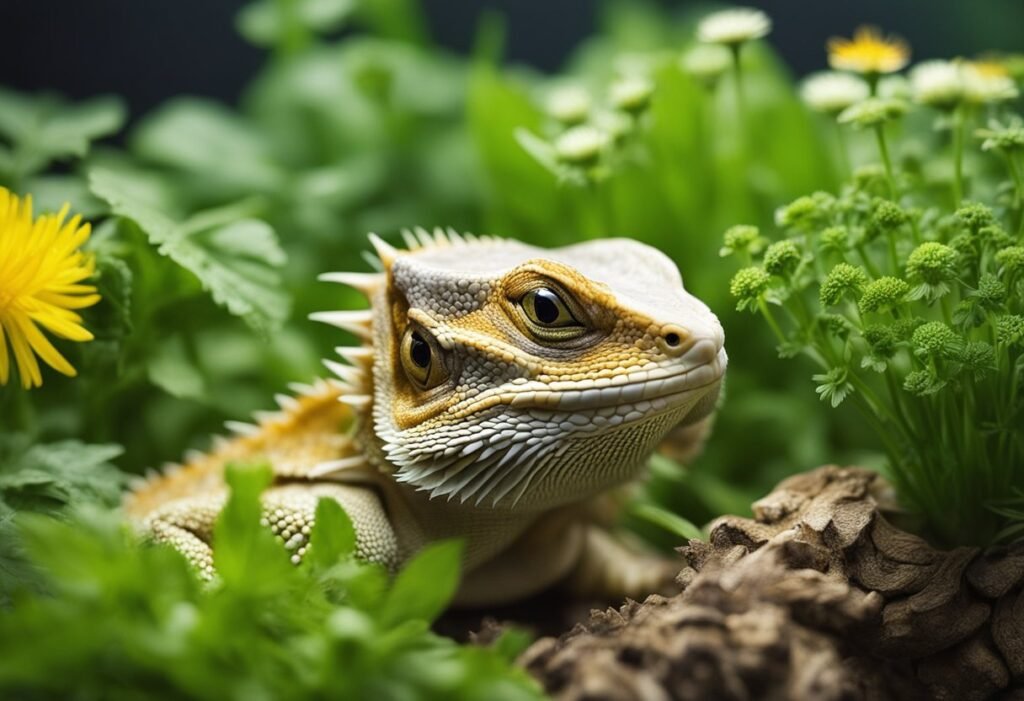
As herbivores, bearded dragons require a diet rich in vegetables and herbs to maintain their health. However, not all herbs are safe for them to consume. In this section, we will discuss some of the safe herbs for bearded dragons.
Mint Family Herbs
Mint family herbs, also known as Lamiaceae, are safe for bearded dragons to consume. These herbs are rich in vitamins and minerals that are essential for their health. Some of the mint family herbs that bearded dragons can eat include:
- Basil
- Oregano
- Sage
- Thyme
These herbs not only add flavor to their diet but also provide a range of health benefits. For instance, basil is rich in vitamin K, which helps in blood clotting, while sage is a natural antiseptic that can help prevent infections.
Leafy Green Herbs
Leafy green herbs are another group of herbs that bearded dragons can eat. These herbs are rich in fiber, vitamins, and minerals that are essential for their growth and development. Some of the leafy green herbs that bearded dragons can eat include:
- Dandelion greens
- Collard greens
- Mustard greens
- Endive
These herbs are also low in oxalates, which can cause kidney stones in bearded dragons. However, it is important to note that spinach and kale should be avoided as they are high in oxalates.
Culinary Herbs
Culinary herbs are another group of herbs that bearded dragons can eat. These herbs not only add flavor to their diet but also provide a range of health benefits. Some of the culinary herbs that bearded dragons can eat include:
- Parsley
- Rosemary
- Cilantro
- Marjoram
These herbs are rich in vitamins and minerals that are essential for their health. For instance, parsley is rich in vitamin C, which helps in the absorption of iron, while rosemary is a natural antioxidant that can help prevent cell damage.
In conclusion, bearded dragons can safely consume a variety of herbs that are rich in vitamins and minerals. However, it is important to ensure that the herbs are fresh and free from pesticides and other harmful chemicals. Additionally, it is recommended to consult with a veterinarian to ensure that your bearded dragon’s diet is balanced and meets their nutritional needs.
Benefits of Herbs in a Bearded Dragon’s Diet
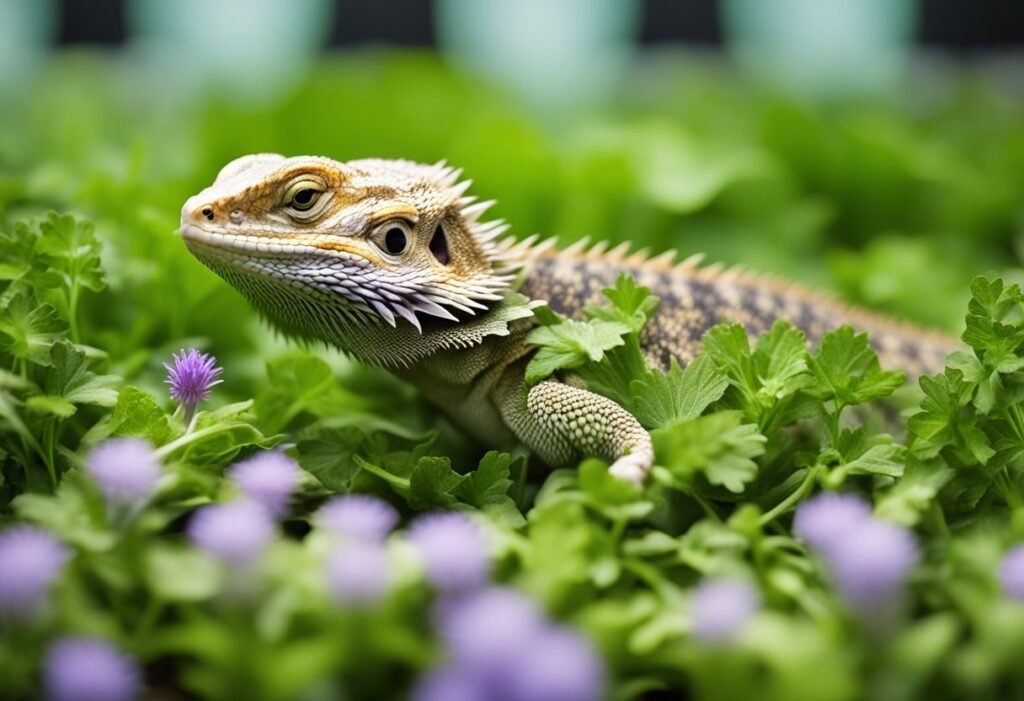
Including herbs in a bearded dragon’s diet can provide several benefits for their overall health. Here are some of the benefits of feeding herbs to your bearded dragon:
1. Nutritional Value
Herbs are a great source of vitamins and minerals that are essential for a bearded dragon’s health. For instance, basil is rich in vitamin K, iron, and calcium, while parsley is a good source of vitamin C, vitamin A, and potassium. Feeding your bearded dragon a variety of herbs can help ensure they receive a well-rounded diet.
2. Digestive Health
Many herbs have properties that can aid in digestion and prevent gastrointestinal issues. For example, dandelion greens can act as a natural laxative, while chamomile can soothe an upset stomach. Including these herbs in your bearded dragon’s diet can help promote healthy digestion and prevent constipation.
3. Hydration
Some herbs, such as cilantro and parsley, have high water content and can help keep your bearded dragon hydrated. This is especially beneficial for bearded dragons that are prone to dehydration or live in hot, dry environments.
4. Enrichment
Feeding your bearded dragon a variety of herbs can provide enrichment and mental stimulation. Bearded dragons are natural foragers and enjoy exploring and tasting new foods. Offering a variety of herbs can help keep your bearded dragon engaged and prevent boredom.
Overall, including herbs in your bearded dragon’s diet can provide several benefits for their health and well-being. However, it’s important to research and choose herbs that are safe for your bearded dragon to eat and avoid any that may be toxic.
Feeding Guidelines for Bearded Dragons
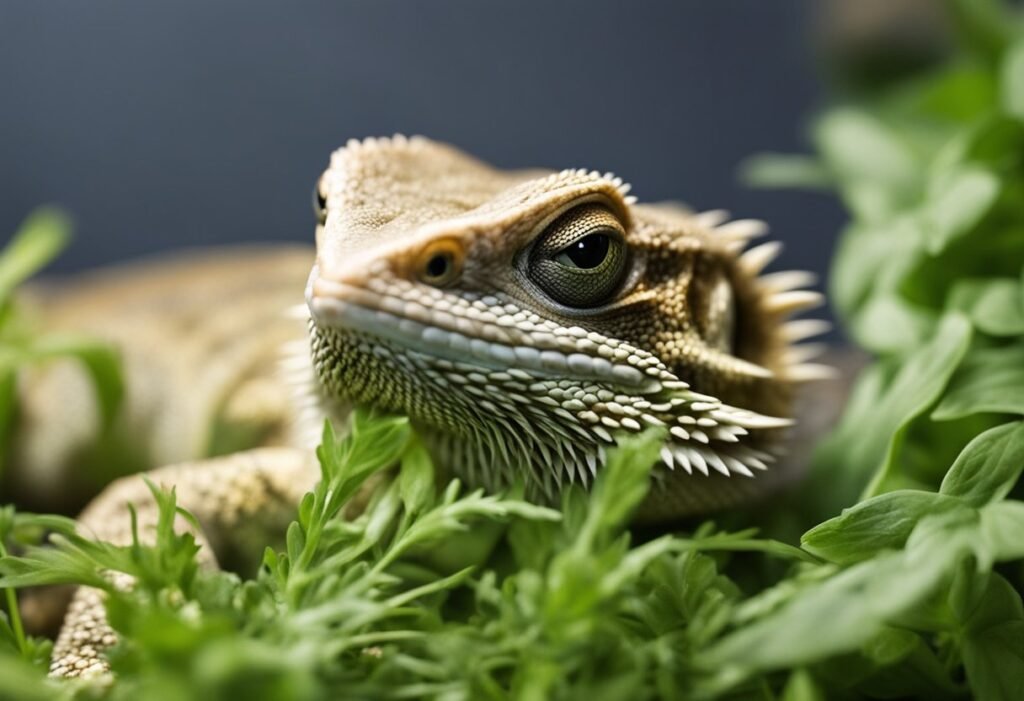
When it comes to feeding bearded dragons, it’s important to provide them with a balanced diet that includes a variety of different foods. While insects are a staple part of their diet, herbs can also be a great addition to their meals.
Frequency of Feeding Herbs
Herbs can be fed to bearded dragons on a daily basis, but it’s important to mix it up and not feed the same herb every day. We recommend rotating between different herbs to provide a variety of nutrients and prevent boredom.
Portion Sizes for Herbs
When feeding herbs to bearded dragons, it’s important to provide the right portion sizes. Too much of any herb can lead to digestive issues, so it’s important to feed them in moderation. We recommend feeding a small handful of herbs, roughly the size of the bearded dragon’s head, once a day.
Some herbs that are safe for bearded dragons to eat include dandelion greens, collard greens, parsley, and cilantro. It’s important to avoid feeding them herbs that are toxic or high in oxalates, such as spinach or rhubarb.
Overall, incorporating herbs into a bearded dragon’s diet can provide them with a variety of nutrients and add some variety to their meals. By following these feeding guidelines, you can ensure that your bearded dragon stays healthy and happy.
Herbs to Avoid

As we mentioned earlier, bearded dragons are omnivores and can eat a wide variety of herbs. However, there are a few herbs that should be avoided as they can be harmful or even toxic to your pet.
Here are some herbs that we recommend avoiding:
- Aloe vera: While aloe vera has many health benefits for humans, it can be toxic to bearded dragons and cause diarrhea, vomiting, and even death in severe cases.
- Daffodil: All parts of the daffodil plant, including the bulbs and flowers, are poisonous to bearded dragons and can cause vomiting, diarrhea, and even seizures.
- Hemlock: Hemlock is a highly toxic herb that can cause respiratory failure and death in bearded dragons if ingested.
- Ivy: Ivy contains saponins, which can cause gastrointestinal upset, vomiting, and diarrhea in bearded dragons.
- Mistletoe: Mistletoe is toxic to bearded dragons and can cause vomiting, diarrhea, and even seizures.
It’s important to note that this is not an exhaustive list, and there may be other herbs that should be avoided. If you’re unsure about whether a particular herb is safe for your bearded dragon to eat, it’s best to err on the side of caution and avoid it altogether.
Preparing Herbs for Your Bearded Dragon

Washing and Cleaning
Before feeding herbs to your bearded dragon, it is important to thoroughly wash and clean them. This will help remove any dirt, pesticides, or other harmful substances that may be present on the surface of the herbs. To wash the herbs, we recommend placing them in a colander and rinsing them under cold running water for several minutes. It is important to be gentle when washing the herbs to avoid damaging them.
Chopping and Serving
After washing the herbs, it is important to chop them into small pieces before serving them to your bearded dragon. This will make it easier for your pet to eat and digest the herbs. We recommend using a sharp knife or herb scissors to chop the herbs into small pieces. It is important to remove any stems, seeds, or other parts of the herb that may be difficult for your bearded dragon to eat.
When serving the herbs to your bearded dragon, we recommend placing them in a shallow dish or on a plate. It is important to avoid overcrowding the dish to make it easier for your pet to eat. You may also want to mix the herbs with other foods, such as fruits or vegetables, to make them more appealing to your bearded dragon.
By following these simple steps, you can ensure that your bearded dragon is getting the proper nutrition it needs from the herbs you feed it. Remember to always consult with your veterinarian before making any changes to your pet’s diet.
Frequently Asked Questions
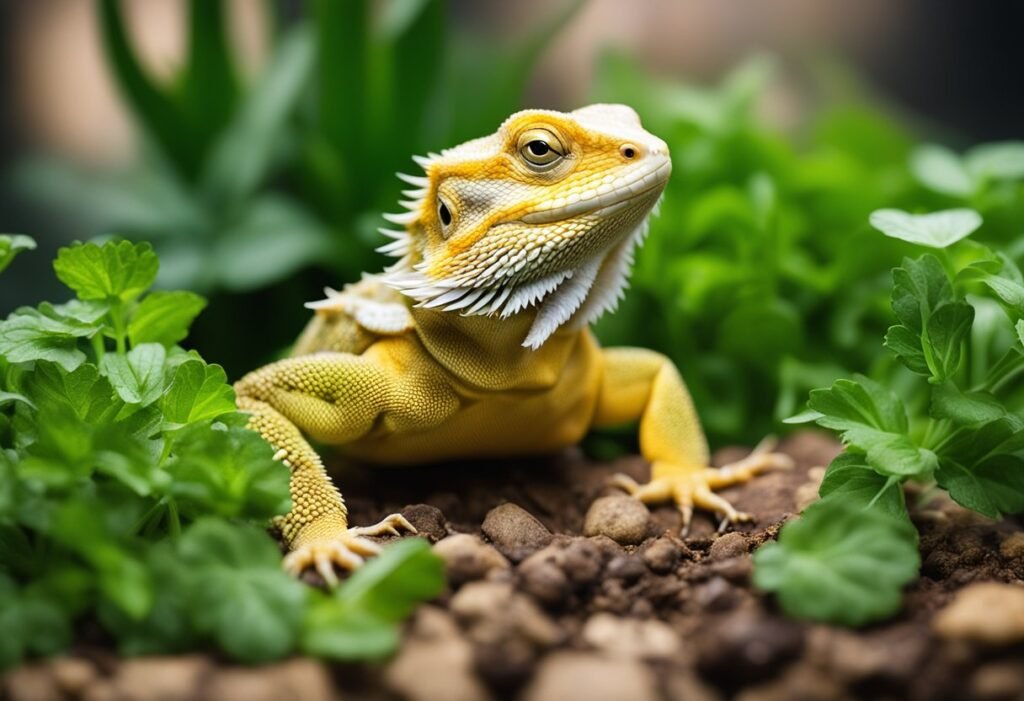
Which herbs are safe for bearded dragons to consume regularly?
Bearded dragons can consume a variety of herbs as part of their regular diet. Some safe options include parsley, basil, dandelion greens, and cilantro. These herbs provide a range of nutrients and can help keep your bearded dragon healthy.
Is mint a suitable herb for bearded dragons to eat?
While mint is not toxic to bearded dragons, it is not recommended as a regular part of their diet. Mint can be difficult for bearded dragons to digest and may cause digestive issues if consumed in large quantities. It is best to stick to safer options like parsley or dandelion greens.
Can I include coriander in my bearded dragon’s diet?
Yes, coriander is a safe herb for bearded dragons to consume in moderation. It is a good source of vitamins and minerals and can be a healthy addition to their diet.
Are there any restrictions on feeding oregano to bearded dragons?
Oregano is safe for bearded dragons to consume in small amounts, but should not be a regular part of their diet. It contains high levels of essential oils that can be difficult for bearded dragons to digest and may cause digestive issues if consumed in large quantities.
What are the best herbs to incorporate into a bearded dragon’s diet?
Some of the best herbs to incorporate into a bearded dragon’s diet include parsley, basil, dandelion greens, cilantro, and rosemary. These herbs provide a range of nutrients and are easy for bearded dragons to digest.
Which plants should be avoided to prevent toxicity in bearded dragons?
Bearded dragons should avoid consuming plants that are toxic to them, such as rhubarb, avocado, and nightshade plants. These plants can cause digestive issues, organ damage, and even death in severe cases. It is important to research any new plants before adding them to your bearded dragon’s diet.

I, Mark Antonelli am highly interested in pet care tips. The experiences I gained through university life in animal sciences were also helpful to identify the best tricks for caring for and feeding varying kinds of pets. I know the majority of people love to own a pet. Yet, there is a guilty of owing a Bearded Dragon due to a lack of information about how much friendly and peaceful they are. I thought of filling this gap with detailed writings about this Pogona genus Bearded Dragon. All my team is also giving me great support to fulfil my mission. Hope you will enjoy the journey with us.

